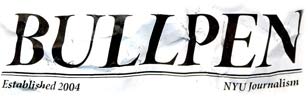Backgrounder: Errol Louis
RELATED:
“I have never taken a journalism course,” admits Errol Louis, 41, a local affairs columnist at the New York Daily News.
The New York native's interest in journalism bloomed early, rooted in a childhood love of comics. In second grade, he would run to the store to buy his dad the Daily News and the Times; with the change he was allowed to get himself comics. Eventually, Louis began reading the papers. His mother, noticing her son's changing interest, borrowed years of back issues of Time, Newsweek, and New York magazine from their dentist.

Party On: Vince Tabone, vice-chairman of the Queens County Republican Party, pals around with Errol Louis at The New York Sun’s anniversary party, April 15, 2003. Photo courtesy MediaBistro.com.
“I did not consciously distinguish between the newsweeklies and my comics: both involved serialized, dramatic stories of epic conflicts, war, death, and intrigue, with lots of color pictures,” says Louis. “I dove in, graduating from Batman to politics with no intervening steps.”
Another push came when he was in 5th grade and the Watergate scandal broke. The teachers at Louis's school had their students buy subscriptions to The New York Times in order to follow the story. The budding news maven's years of reading resulted in a comprehensive knowledge of the Vietnam War, Watergate, urban riots, the 1973 Mideast War, and the Nixon, Ford, and Carter administrations.
“I also got a gut feel for the right way to tell a news story,” says Louis.
As it happened, the first story he wrote landed on the cover of the Amsterdam News: “Police Break Child Sex Ring In Brooklyn.” It was the summer of 1982, after his freshman year at Harvard. The 19-year-old Louis was learning the ropes in a work-study summer internship for the now-defunct Brooklyn-based Trans-Urban News Service. This non-profit service sold stories to local outlets to help African-American and Latino writers get into the news business. Luckily, the News snapped up Louis's first try at a reported story.
During his four years at Harvard, Louis wrote about three or four opinion essays a week for The Harvard Crimson. He also co-edited the paper's arts magazine, which he modeled on The Village Voice, turning it into an arts and commentary magazine.
Another college internship Louis had was a position in the Boston bureau of The Wall Street Journal, in 1983. Even though he wasn't able to write about politics, as he had hoped, he did learn how to file news spots to the Dow Jones wire.
“I did not consciously distinguish between the newsweeklies and my comics: both involved serialized, dramatic stories of epic conflicts, war, death, and intrigue, with lots of color pictures,” says Louis. “I dove in, graduating from Batman to politics with no intervening steps.”
“This was in the days before personal computers and the Internet,” Louis recalls. “It taught tremendous discipline and the ability to compose under pressure. I would recommend that kind of stress-test to all young reporters. You can't have writer's block in the newsroom.”
When he graduated in 1984, he turned down an offer from Dow Jones in order to work for City Sun, a black weekly paper that had risen from the ashes of Trans-Urban. After six months, he quit because the staffers weren't being paid.
Thus began his career as a freelance magazine writer, which lasted from 1984-2002.
In 1997, the reporter and editorial writer put his journalism career on hold for a brief flirtation with politics. He ran for the 35th District Council seat of Central Brooklyn and lost, although he came in third. In a weird twist of fate, he ended up writing the obituaries for the winner of that election, Mary Pinkett, as well as the second-place runner-up, James Davis, both of whom died in 2003.
Although he lost, Louis believes the experience helped prepare him for his present post: a local affairs column at the Daily News. Unlike many columnists, Louis actually prefers to write in the newsroom—if he has his headphones, that is. “Miles Davis, Thelonious Monk, Al Green, and Aretha Franklin probably deserve co-credits on half my articles,” he says.
Louis breaks the writing process into two phases: the “story-selection/opinion-formation” phase and the actual writing. During the first phase, he'll “imagine a man who is much wiser, fairer, experienced, and informed” than he is. Then, he'll mentally interrogate that person to find answers and story angles.
In the writing phase, he plays two roles: the reader and the editor. Louis's final goal is to draft a piece that is fresh, smart, and unusual. He emphasizes the importance of ledes and transitions. Also, he confides, “I like to smuggle in quasi-quotations—sentence rhythms and word choices from my favorite writers.”
Humor matters, too. “In the quest to inform, amuse, and challenge the reader,” says Louis, “my best measure [of success] is the chuckle test: if I like the piece enough to snicker about it on the train ride home, I've had a good day.”

